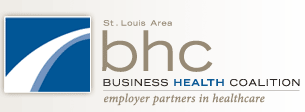 Regional Leader Information
Regional Leader Information
Website: www.stlbhc.org
Region: Missouri
Covered Counties: Missouri (all counties); Illinois (Bond, Calhoun, Clinton, Jersey, Macoupin, Madison, Monroe, St. Clair)
Contact: Laurel Pickering
Title: President & CEO, St. Louis Area Business Health Coalition
Address: 8888 Ladue Road, Suite 250, St. Louis, MO 63124
Phone: 314.721.7800
Email: lpickering@stlbhc.org
The St. Louis Area Business Health Coalition (BHC) is a non-profit organization serving St. Louis employers for over 20 years. Its mission is to support employers in their efforts to enhance the quality and overall value of their investments in health benefits while seeking to improve the health of their enrollees.
Why did your organization decide to apply to become a Leapfrog Regional Leader?
BHC’s interest in becoming a Regional Leader is derived from its vision of a community where comparative cost and quality data on health care treatments and providers is freely available and used by consumers, employers, health plans, and providers in making health care, health benefit, and provider compensation decisions.
BHC applied to be part of the first wave of Regional Leaders because of the cross cutting system-wide improvements targeted by Leapfrog. Although research demonstrated the benefits in system improvements (such as the implementation of computerized provider order entry and intensivists staffing), these improvements were all but being ignored by the provider community. Adoption rates by hospitals were disturbingly low, in part, because none of these system improvements generates additional revenues on its own. The Leapfrog Group’s work helped hasten the adoption of safe practices through its voluntary survey that differentiated hospitals’ performance, informed the public, and helped motivate hospitals to improve patient safety faster.
In your view, what kind of impact has Leapfrog had on your market thus far?
Leapfrog has had a positive impact in the St. Louis market by making it uncomfortable for hospitals that do not report to the survey. Although the response rate from area hospitals is disappointingly low (20%), most hospitals are fully aware of the Leapfrog Group and its four safety leaps. Even though many hospitals have decided not to report, most have reviewed the leaps, allocated capital expenditures in information technology, and re-organized their patient safety priorities to ensure that they meet the criteria.
- Hospitals are moving towards CPOE, electronic medical records, or other IT enhancements;
- Hospitals have intensivists on staff;
- Hospitals are tracking the safe practices to improve the culture of patient safety in their facilities.
- Leapfrog has also had a positive impact on the smaller, rural hospitals which have built upon Leapfrog’s safety practices to improve the culture of patient safety in their facilities.
Market Information
Geographic coverage: St. Louis MSA, which includes southern Illinois
Population: St. Louis MSA includes approximately 2.6 million people
Number of employer/coalition lives in region: approximately 400,000 in the region
List of area’s largest employers (information based on St. Louis Business Journal Book of List 2006):
BJC HealthCare – 21, 814
Boeing Integrated Defense Systems – 16,259
Scott Air Force Base – 13,065
Washington University in St. Louis – 12,505
Wal-Mart Stores Inc. – 11,921
SSM Health Care – 11,905
Schnuck Markets Inc – 10,700
SBC Communications Inc. – 9,920
St. John’s Mercy Health Care – 8,699
McDonald’s – 8,000
Hospital characteristics:
Total number of general acute care facilities (total number of targeted hospitals broken down by hospital system)
BJC HealthCare – 11 hospitals
SSM Health Care – 6 hospitals
Tenet Health Systems – 2 hospitals
Doctors Community Health Care – 2 hospitals
St. John’s Mercy Health Care – 2 hospitals
12 other hospitals
Total number of beds – 9,090
Insurer characteristics:
Local health plans and % of the market share for HMO/PPO products (state-wide statistics based on 2005 Consumer’s Guide Commercial Managed Care in Missouri. This does not include lives in self-funded plans. St. Louis MSA specific statistics is not available)
Aetna – 3.2%
BCBS Missouri – 18.6%
Cigna – 1.1%
Coventry Health Care of Kansas Inc – 10.7%
Group Health Plan – 25.6%
Health Link – 2.4%
Humana – 3.2%
Mercy Health Plans of Missouri – 12.9%
UnitedHealthCare of the Midwest Inc - 9.3%
State/Local government activities:
The “Missouri Nosocomial Infection Control Act”, which passed in 2004, requires health care facilities to take appropriate actions to decrease the risk of infection and to report the rate certain types of infections, including:
- Central-line bloodstream infections
- Surgical site infections
- Ventilator-assisted pneumonias.
- Initiatives to require adverse events reporting and make hospital discharge data set publicly available have also been introduced in Missouri.
